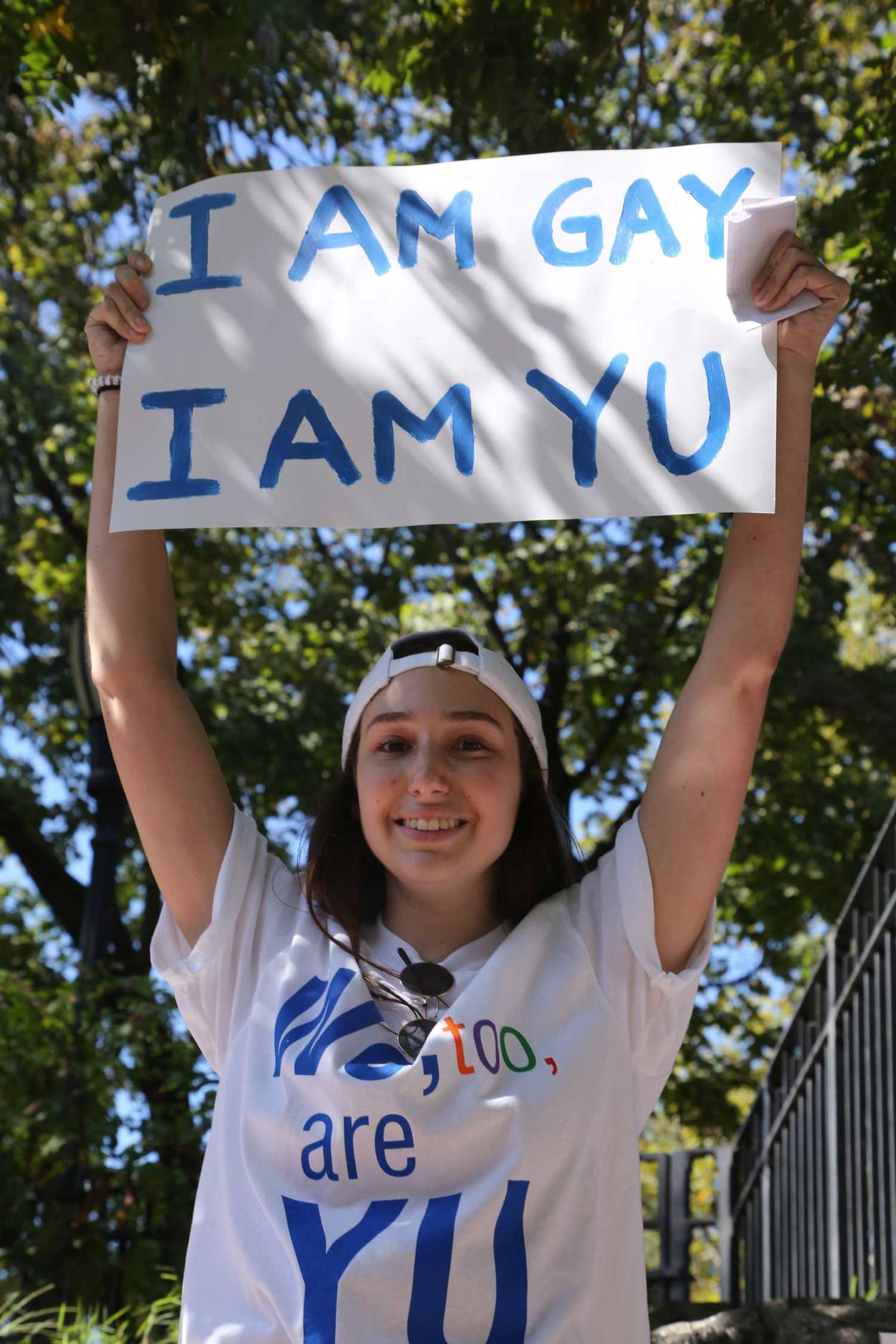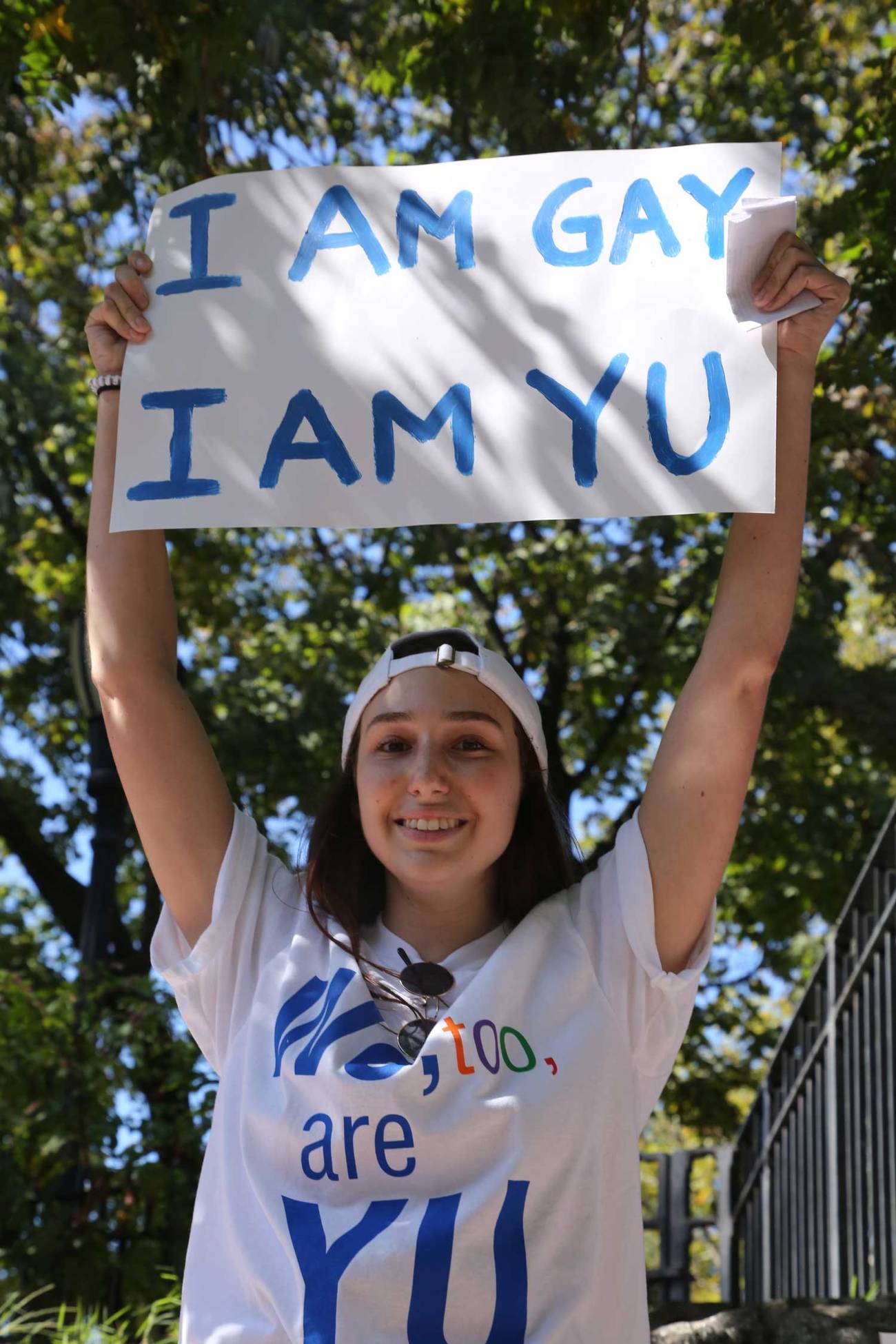LGBTQ+ at Yeshiva University: The Path Forward
Learning from the past to engage with the future

Michael Luongo

Michael Luongo

Michael Luongo

Michael Luongo
What do you do when an institution that is essential to your Jewishness does something that your Jewishness simply cannot accept?
This is the question we—two Yeshiva University alumni—have been grappling with since the fall of 2022, when YU signaled its intention to take a case brought by its LGBTQ+ students, alleging discrimination, to the United States Supreme Court.
Much ink has already been spilled on this contentious case, a sensitive and deeply complex conflict that has been aired out in public like dirty laundry on the clothesline of American Orthodox Judaism. We are not here to offer critiques of either side. We, as alumni, understand the institutional priorities and allegiances of YU, and we know how hard the students of the YU Pride Alliance tried to negotiate in good faith for a space of their own at YU, making many sacrifices along the way.
We are here to offer a solution. And the solution to this conflict is to return it to what it started as, before it captured the attention of critics of Orthodox Judaism on the left, and religious freedom enthusiasts on the right: a conversation.
In order for this conversation to happen, however, both sides need to be ready for it. Over the course of these many months, we ourselves have engaged in discussion with fellow alumni, students, rabbis, and members of the Orthodox community, to try to determine what this readiness entails, what groundwork needs to be laid before mutual trust and a solution acceptable to both sides can be built together. And we’ve come to the conclusion that there are a few foundational assumptions that need to be agreed upon before mutual trust, and certainly any kind of solution, can be built above that foundation.
We are not the originators of this approach to conflict resolution. It was our ancestor Aaron, brother of Moses, who according to the Sages (Avot of Rabbi Natan 12) brought together people in conflict by finding the common ground on which they both stood, then laying a new foundation on top of it. Sometimes, that common ground was so obviously apparent, it was surprising Aaron’s intervention was necessary at all. But that’s another thing we’ve learned as we’ve done this work: The personal and theological conflicts are so fraught, the positions on both sides so entrenched, that it’s easy to lose sight of why we’re talking about this in the first place. So, striving to emulate Aaron’s example, we present here four foundations—some obvious, others less so—for renewed dialogue between YU and its LGBTQ+ students.
The first foundation draws most directly from Aaron’s approach, which was to remind people in conflict of the goodness at their core: Both YU and its LGBTQ+ students simply want YU to be a place in which LGBTQ+ students feel that they truly belong. For both sides, this desire comes from a place of love and goodwill; for the students, it’s the love of the best university in the world to be an Orthodox college student, and for YU, it’s the love it truly wants to extend to all of its students. The accusations aimed at both parties—of homophobia on one side and of subsumption into secular LGBTQ+ culture on the other—are unfortunate, but perfectly understandable, psychological products of the daunting task of holding two conflicting loves together at once. The students don’t want to burn YU down; YU doesn’t hate LGBTQ+ people. Recognizing this will make it easier for both YU and its LGBTQ+ students to see one another as collaborators, rather than adversaries.
The second foundation: deep, engaged listening. This applies to everyone who has a stake in this conflict, even if they’re not immediately involved or affected by it: community members, YU alumni, rabbis. The less we actively listen the more we give precedence to our own mental model of the other person in front of us rather than the real person in front of us. How is a conversation, much less one convened for the purpose of resolving a complex interpersonal problem, supposed to progress when each conversant is simply building on top of what they think the other person thinks?
The third foundation: This is not a fair fight. Within the Jewish institutional landscape, YU is a behemoth whose actions and statements set the tone for Orthodox communal policy on a wide range of issues. Regardless of the fact that it was the students who brought the lawsuit, YU bears more of the responsibility for resolving the conflict because of its broad communal shoulders. It carries too much of the weight of Orthodox Judaism’s existential angst—as Rabbi Soloveitchik might put it—to simply push away the students with sheer force. Doing so will only widen the schisms that have been forming for years within Orthodoxy, and hurt its long reputation of leading by example.
We need to start talking—and listening—to each other again.
The fourth, and perhaps most important foundation is one we learned not from this work but from the devoted disability rights advocates of the 1990s who set a standard for American community organizing: nothing about us without us. LGBTQ+ people need to be part of every conversation about their inclusion and belonging in Orthodox Judaism. It is their experience that is the impetus for these conversations after all. When they are not present at the table, the implication is that their presence is a problem.
The same holds true for conversations held in public—even if only one person appears to be participating in the conversation. Allow us to provide an example. An article about LGBTQ+ inclusion in the Orthodox community—such as the one published recently in Tablet by a member of the YU administration—should not need to remind its readers about the Torah prohibition on male homosexuality, and certainly not compare being gay to eating a cheeseburger. The reason is simple: When you say or write things about this issue that are either so obvious to LGBTQ+ Orthodox Jews or would be considered insensitive if said directly to them, you communicate that LGBTQ+ Orthodox Jews are not essential participants in the conversation.
We know these conversations can be uncomfortable, especially for people who are not LGBTQ+ themselves. It can be difficult to know what one can and cannot say because of the deeply lived sensitivities involved, on both sides. But the current situation, in which LGBTQ+ Orthodox Jews are not part of these conversations or the conversations are avoided entirely, is untenable. LGBTQ+ Orthodox Jews feel at best unwanted, at worst ostracized. And we’ve known for a while that this issue is a matter of sakanat nefashot, risk to life.
The Talmud (Sanhedrin 6b) contrasts Aaron’s approach to conflict resolution to that of his brother Moses. While Moses insisted on giving the letter of the law the final say—regardless of its interpersonal consequences—Aaron preferred to mediate between the two sides in conflict. It is noteworthy that the Talmud uses a curiously destructive phrase to describe Moses’ style: “the law should pierce the mountain.” In this moment, the Moses path to an end to this conflict is clear, harshly clear even. But as the Talmud concludes, it is Aaron, not Moses, who is described by the Prophet Malachi (Malachi 2:6) as the paragon of virtue, and the one who was able to integrate the often-competing values of emet (truth) and shalom (peace) in his leadership. It is time to let him lead the way.
We, the founders of RiseUpYU among many others in this community, wish to simply and unequivocally urge Yeshiva University and members of the Orthodox community with pulpits and power to approach this with Aaron’s model in mind:
We are calling for a radical and what will be for many a deeply uncomfortable shift in the definition of acceptance.
We urge community members, clergy, and laypeople to recognize the anxiety of squaring this acceptance with halachic authority, and to put this second to the mental and physical well-being of our LGBTQ+ siblings for whom neither being LGBTQ+ nor Orthodox is a choice.
Doing this would put the emphasis of pikuach nefesh, saving lives, first and the discourse around Halacha and the LGBTQ+ population second. That move alone would pave the way for a halachic approach that is fully informed by the lived experience of LGBTQ+ Orthodox Jews, and is ultimately more conducive to their full inclusion and belonging in Orthodox communities.
But before that happens, we need to start talking—and listening—to each other again. RiseUpYU is here to stand up for and stand with our LGBTQ+ community members, to model respectful, and authentic, dialogue and to translate thought and discourse into action.
We invite you to join us.
Netanel Zellis-Paley (YC ’18) and E.Y. Zipris (SCW ’01) are founders (along with fellow YC and SCW alumni) of RiseUpYU, a movement of Yeshiva University alumni and community members mobilizing for the full belonging of LGBTQ+ Jews in Orthodox communities.